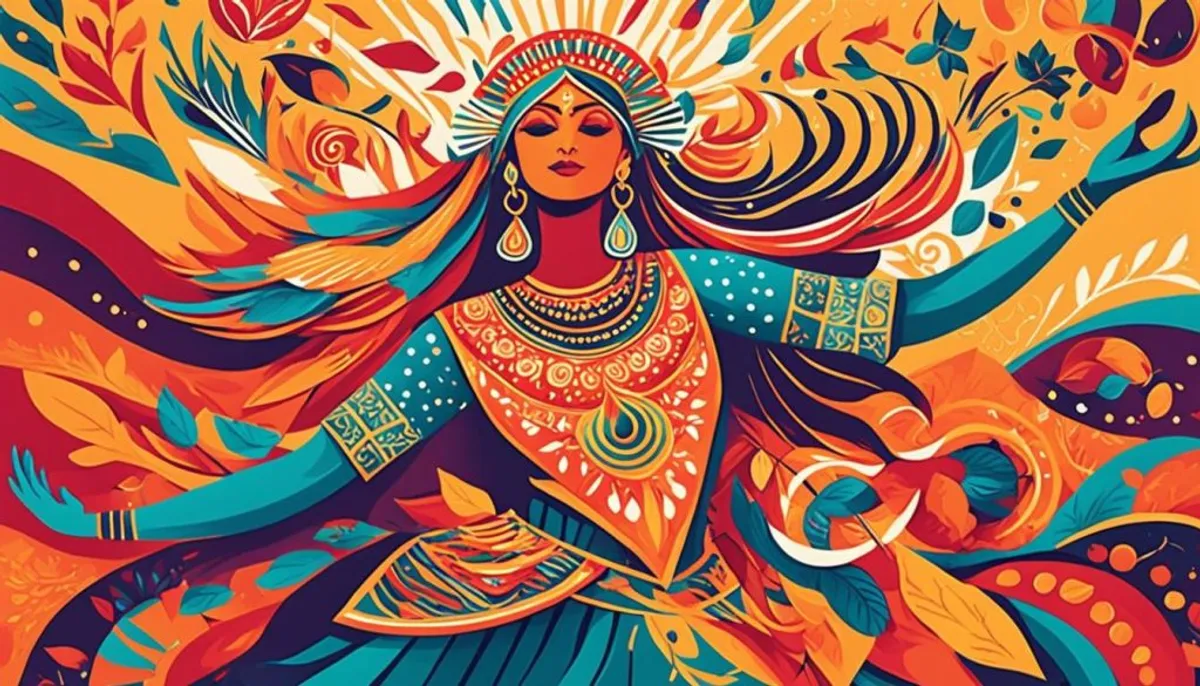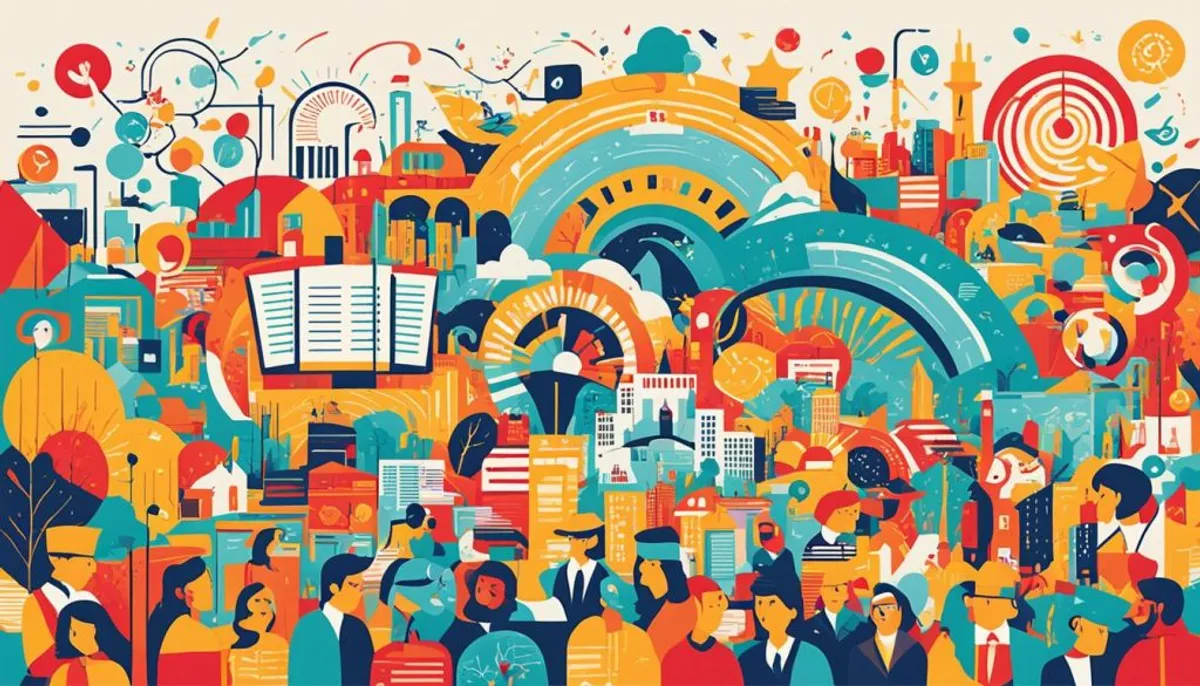The culture is everywhere in our lives in France and beyond. It includes the unique, spiritual and material, intellectual and emotional traits. These traits define a society or a group.
The culture is essential for a society that moves. It is seen in our stories, our memories, our entertainments, and our dreams. It changes all the time and is passed down from generation to generation.

What is culture and what is its role in society?
Culture is more than just arts and literature. It captures our identity, our traditions, and our way of life. But, what is culture really? And why is it so important?
Definition of culture
The word “culture” comes from the Latin “cultura,” meaning “to cultivate.” Culture is the set of traits that define a society or a group. It includes arts, letters, lifestyles, human rights, values, traditions, and beliefs.
The importance of culture in a dynamic society
Culture is crucial in a changing society. It transmits our history and our values. It is seen in our stories, our past, our entertainments, and our dreams. Culture evolves and is shared within the community.
| Definition of culture | Meaning of culture | Role of culture | Importance of culture |
|---|---|---|---|
| The set of distinctive, spiritual, material, intellectual, and emotional traits that characterize a society or social group. | Culture represents the very essence of our identity, our traditions, and our way of life. | Culture allows us to transmit our history, our traditions, and our values from one generation to another. | Culture is a vital element for a dynamic society; it evolves over time and is shared among community members. |
The intrinsic benefits of culture
Culture is more than just a simple role in society. It brings numerous personal and emotional benefits. These advantages touch our experiences and personal growth.
The pleasure and wonder brought by culture
Cultural activities offer profound pleasure and wonder. Whether at the theater, museum, or concert, they invite contemplation. They evoke strong emotions, providing a moment of pause.
The expression of creativity and the strengthening of identity
Culture helps people to express themselves creatively and to strengthen their identity. By participating in artistic activities, they develop their creativity. They also feel more rooted in a community, which is good for their well-being.
The benefits of culture on education and learning
Culture is very important for improving academic results. It also aids cognitive development. Cultural activities like music and theater help children think more openly. This also boosts their self-confidence.
Studies in the United States show that schools with arts programs perform better in reading and mathematics.
The role of libraries and cultural heritage in education
Cultural heritage offers new opportunities to learn and understand history. Libraries are essential for education. They are places of knowledge and information.
Libraries provide access to many cultural and educational resources for free. Local heritage helps students better understand their history and identity.
Culture and libraries encourage lifelong learning. This helps develop skills throughout life.
- Libraries offer free access to a wide range of cultural and educational resources.
- Local cultural heritage allows students to explore their history and identity in depth.
- Lifelong learning fostered by culture and libraries contributes to skill development throughout life.
In conclusion, culture is crucial for education and learning. It improves academic results and develops cognitive abilities. It also values local cultural heritage.
The positive impact of culture on health and well-being
Culture is very important for our well-being and health. Many studies show that engaging in culture improves our physical and mental health.
Participating in artistic and creative activities can combat isolation. It also helps to feel important and to belong to a group. Culture and well-being are closely linked. Creativity enhances our self-esteem and sense of belonging.
For First Nations, Métis, and Inuit, reclaiming their culture is essential for their health. Culture and health are very connected for them. Traditions allow them to reconnect with their history and identity.
| Benefits of culture on health | Examples |
|---|---|
| Improvement of mental health | Reduction of isolation, development of self-esteem |
| Promotion of physical well-being | Participation in physical activities, stimulation of creativity |
| Strengthening of identity and healing | Revitalization of indigenous cultures |
In conclusion, engaging in culture and well-being is very beneficial. It improves mental and physical health for individuals and communities.

Why culture is important for dynamic communities
Culture is crucial for creating a dynamic and happy community. Festivals, fairs, and gatherings are perfect for bringing people together. They help strengthen social cohesion and tolerance. A well-defined issue around these events can also help better understand the needs of the community.
Our cultural heritage tells our story. It strengthens the sense of belonging and pride in living together. Valuing this heritage boosts community dynamism and helps the flourishing of all.
The strengthening of social cohesion and tolerance
Culture plays a key role in social cohesion and tolerance. It brings people together around common projects. This improves integration, autonomy, and community skills.
This strengthens trust, pride, and open-mindedness. People become more united.
The valorization of cultural heritage and regional development
Cultural heritage is essential for identity and regional development. Valuing these resources attracts tourists and investors. This creates a strong and attractive image for the territory.
In conclusion, culture is key for united and prosperous communities. It promotes social cohesion, tolerance, and the valorization of cultural heritage. This contributes to a solid and thriving regional development.
The economic contribution of culture
The cultural sector is crucial for the economy. It creates jobs directly and indirectly. In 2010, culture represented 3.7% of Ontario's GDP, nearly 22 billion dollars. This sector also created about 280,000 jobs, or 4.1% of total employment.
The creation of jobs in the cultural sector
Culture and employment are closely linked. The cultural sector offers many jobs in arts, media, entertainment, and heritage. These jobs help the local and regional economy. They also encourage the creative economy.
Support for innovation and productivity
Culture positively influences innovation and productivity in other sectors. Interactive multimedia products, for example, boost growth and employment. Culture also aids in regional development, branding, and local tourism. This creates a dynamic and productive economy.

In conclusion, culture is a key economic pillar. It supports employment, innovation, and productivity in many fields. Its impact on the economy makes it an essential element for a prosperous society.
Conclusion
Culture is crucial for a thriving and fully lived society. It manifests in many ways, individually, in family, or in the community. The French have a rich cultural heritage, enriching their knowledge and understanding of the world.
Culture brings pleasure and wonder. It stimulates creativity and strengthens identity. It positively influences education, health, and well-being. Moreover, it creates jobs and supports economic innovation.
It is vital to value and transmit our cultural heritage. This will help maintain an open, tolerant, and flourishing society. The writing of synthesis is a valuable tool in this process. Everyone must contribute to preserving and sharing our cultural riches, essential to our nation.
RelatedRelated articles


